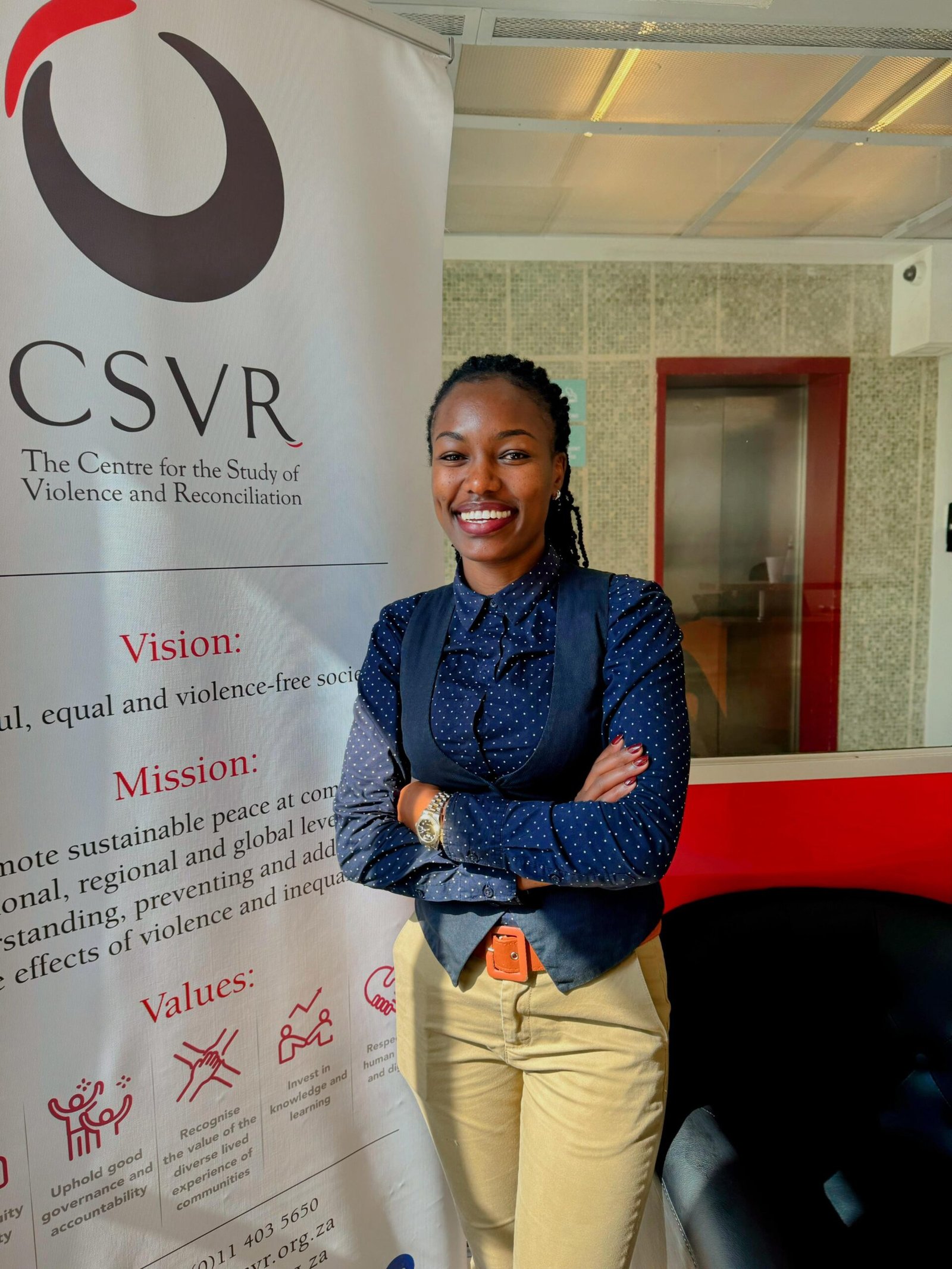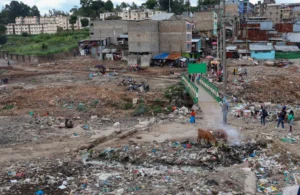Teresa Abel of MIDRIFT HURINET is emerging as a rising voice in advancing youth-led approaches to peace and security across Africa.
Teresa is currently based in South Africa as an exchange fellow through the Norwegian Agency for Exchange Cooperation (NOREC) program, which helps young professionals gain international experience and expertise in sustainable development. She is hosted by the Centre for the Study of Violence and Reconciliation (CSVR), an independent non-governmental organization (NGO) established in South Africa in 1989. At CSVR, Teresa is engaged in a transformative journey that combines research, monitoring and evaluation, violence prevention, policy advocacy and accountability, and strategic community engagement.
Teresa’s current position demonstrates how youth-led initiatives, when combined with international exposure and institutional support, can transform young professionals into powerful agents of accountability and peacebuilding globally. Through her strategic engagement in youth-led initiatives, Teresa’s experience reflects a broader continental movement: positioning young people not just as beneficiaries of peace and security programs, but as architects of solutions, custodians of accountability, and catalysts of sustainable change.
MIDRIFT HURINET’s youth-led interventions are redefining the architecture of peace, accountability, and community cohesion. Rooted in the belief that young people are not merely future leaders but present-day change agents, the organization has cultivated platforms where sports become a bridge between divided groups, dialogue transforms grievances into solutions, and strategic management skills equip youth to run their community programs with precision and impact. Through initiatives that blend leadership training, peace forums, and participatory advocacy, MIDRIFT HURINET positions youth as both promoters of accountability and innovators of localized solutions to peace, security, and governance challenges.
Cross-cultural learning, informed by exchange programs and peer-to-peer mentorship, enriches these efforts, enabling young leaders to adapt global best practices to local realities. The result is a dynamic ecosystem where youth-led programs do more than fill service gaps: they promote trust, dismantle barriers, and nurture resilient, inclusive communities where peace is sustained through strategic action and shared responsibility.
Youth as Architects of Accountability in Peace and Security
“Being part of the NOREC exchange program in South Africa has been both a personal and professional turning point.” Teresa reflects, “At MIDRIFT HURINET, I actively engaged in youth-led initiatives that promote peacebuilding, good governance, and social cohesion. Working with CSVR has deepened this experience, exposing me to how evidence-based approaches in violence prevention, policy advocacy, and accountability strengthen collaborative action.”
In Teresa’s work, this has meant moving beyond ad hoc activities to strategies informed by research and consistent monitoring and evaluation. For example, violence prevention becomes more effective when interventions are designed around community-level data that identify root causes of conflict, such as Xenophobic attacks or mistrust between communities and state security institutions.
Similarly, policy advocacy gains traction when youth leaders can present credible evidence that links their community experiences to broader governance gaps. Accountability is reinforced when programs integrate clear indicators, transparent reporting, and regular feedback loops with the communities they serve. By blending communities’ responsibility with evidence-based interventions, Teresa’s experience depicts that youth-led initiatives can achieve legitimacy, influence decision-makers, and create lasting impact that extends beyond single projects. Her journey illustrates how cross-cultural exchange empowers young leaders to adapt global tools to local realities, and how research, monitoring, and transparency can turn youth programs into models of accountability.
Cross-Cultural Learning for Regional Stability
Teresa’s experience highlights how cross-cultural learning provides exposure while translating diverse perspectives into practical tools for regional stability. By working with diverse communities, partners, stakeholders, and both state and non-state actors, she has gained insight into how different communities confront challenges such as conflict rooted in patriarchal systems, violence, insecurity, and xenophobia, and how these lessons can be adapted to local contexts in Kenya and across Africa. Reflecting on this, Teresa notes, “Seeing how South Africans confront xenophobia has taught me that peacebuilding must be intentional, and that communities themselves must lead the process of reconciliation. These lessons resonate strongly with our work in Kenya, where mistrust between youth and state security institutions is also a pressing issue. By applying such insights back home, youth leaders can strengthen community cohesion and adapt tested approaches to local realities.”
Cross-cultural exchange promotes empathy and breaks down stereotypes, enabling young leaders to view peace and security as shared responsibilities that transcend borders. It also equips youth with comparative insights, showing them what works, what fails, and why context matters in shaping interventions. This exchange of knowledge and practice builds a regional network of young peacebuilders who can coordinate efforts, learn from each other’s successes and mistakes, and collectively strengthen resilience against conflicts that often spill across national boundaries. In this way, cross-cultural learning emerges as a critical driver for unity, innovation, and sustainable peace in Africa.
Integrating Accountability into Youth Development Frameworks
Teresa shares her reflection, noting that, “Perhaps the most striking commonality between Kenya and South Africa is the centrality of accountability. In South Africa, communities encourage young people to lead with integrity, and they demand transparency and accountability from institutions. At MIDRIFT, we work to build a similar culture where young people are not just participants in programs but decision-makers who set priorities and report outcomes to the organization, their peers, and communities.” These parallels reveal that accountability is both a right and a responsibility that youth must practice in their leadership, and they ought to be empowered to ensure that those in authority also embrace it.
Conclusion
Teresa believes that the exchange has strengthened her conviction that youth are the backbone of peace and security efforts in Africa. She reflects, “When accountability is integrated into youth development, it creates leaders who are responsible and can be trusted. When cross-cultural exchange informs local action, it broadens perspectives and strengthens regional resilience. The task now is to connect these lessons and reimagine youth-led peacebuilding as both local and regional, and always rooted in the lived realities of young people.”
By: Jacob Karani



